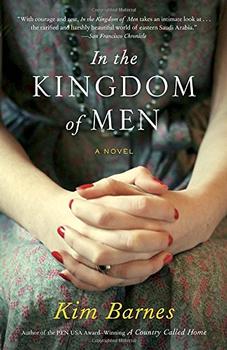Summary | Excerpt | Reviews | Beyond the Book | Read-Alikes | Genres & Themes | Author Bio

A Novel
by Kim BarnesThis article relates to In the Kingdom of Men
In In the Kingdom of Men, Gin McPhee finds herself plopped inside an ARAMCO (Arabian American Oil Company) compound in the 1960s, an oasis that is neither wholly American nor Arabic but is somehow an incongruous mashup within a country still grappling with the culture shock wrought by 20th century capitalism. But what did that culture shock look like in real life?

Eons of social and economic tradition had established a tight symbiotic relationship between Arab desert nomads (Bedouin) and the stationary farmers and villagers; nomads tended to the grazing livestock while the stationary families produced consumable goods, from tent poles to dates. Very few people were wage earners. It had always been a mostly self-contained, life-sustaining economy that valued family over all else. Traditional Arab families consist of fathers and children. Women - wives, mothers - remained in the families of their fathers, even after marriage. They kept their fathers' names and could own property, but in civil matters women were virtually invisible. While marriage was a civil contract, in Arabia there was, and is, no such thing as separation of church and state; in fact Article One of the country's basic law states that "God's Book (the Qur'an) and the Sunnah of His Prophet" are the country's constitution. Thus, in essence, the Qur'an dictates everything from who can get a driver's license to divorce terms and conditions, all the way to how a woman is supposed to dress.
The modern state of Saudi Arabia was created in 1932 following about thirty years of fighting that started while the Ottoman Empire still had nominal control over the region, and intensified after the end of the World War I - but the new kingdom wasn't much to write home about - being one of the poorest countries in the world at the time. That changed very quickly in 1938 with the discovery of huge oil reserves and the entry of Western capitalism with its influx of managers and laborers - from the US, England, Germany, Ireland and Canada, among other places - many born and bred on the notion of exceptionalism, personal freedom, and separation of church and state. People who know all too well what it means to work for a wage, invest in progress and scramble - by honest labor or not - to the top. Suddenly a millennia-old culture with few-to-no wage earners, whose biggest export had always been desert-loving produce, began to see wealth and a culture beyond its wildest imagining.

Image of Bedouin family by Tanenhaus (2005).
This vast wealth changed the country exponentially in some ways, particularly with regard to population and education - in 1960, a majority of the 3 million population were nomadic and education was sporadic; today more than 95% of the 25 million residents are settled and, for citizens, there is universal free education and a system of social security. But culturally, it has remained remarkably unchanged. The country is an absolute monarchy with most positions of influence held by members of the very extensive royal family. The five million or so foreign nationals have little in the way of rights. Neither do women, who still must have a male "guardian" (usually a close relative) who is entitled to make important decisions on their behalf, including whether they may attend university or be allowed to travel; and, of course there are still strict cultural norms for women's behavior in public. In 2011, Saudi women were granted the right to vote.
For more information on the history of Saudi Arabia and the events leading up to the discovery of oil there, check out this article entitled, "Prelude to Discovery," by Jane Waldron Grutz, or click on the video below to watch an educational movie about "a venture by American capital in a strange and ancient land," circa 1948.
Filed under Places, Cultures & Identities
![]() This "beyond the book article" relates to In the Kingdom of Men. It originally ran in June 2012 and has been updated for the
February 2013 paperback edition.
Go to magazine.
This "beyond the book article" relates to In the Kingdom of Men. It originally ran in June 2012 and has been updated for the
February 2013 paperback edition.
Go to magazine.
Your guide toexceptional books
BookBrowse seeks out and recommends the best in contemporary fiction and nonfiction—books that not only engage and entertain but also deepen our understanding of ourselves and the world around us.